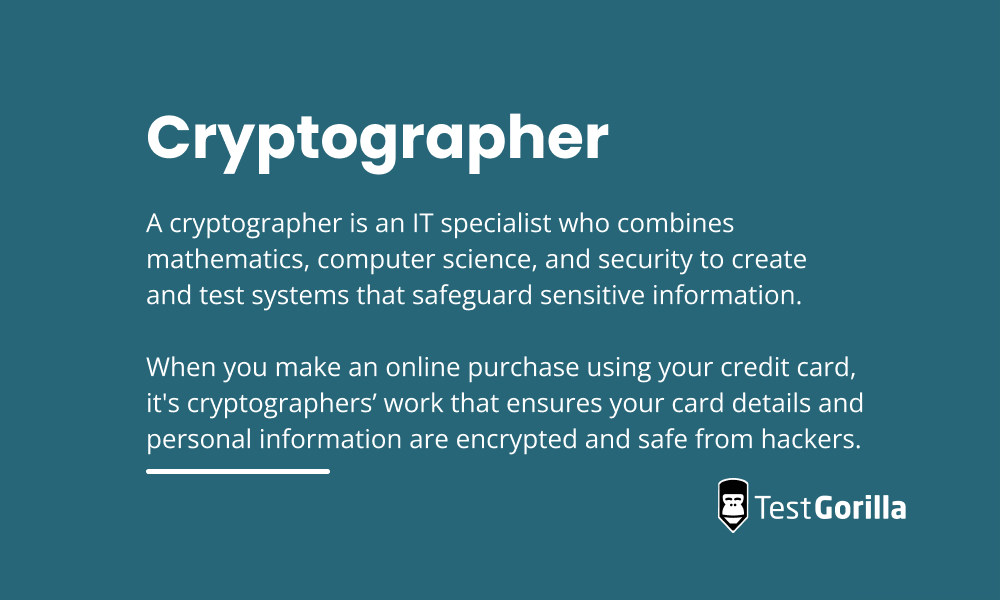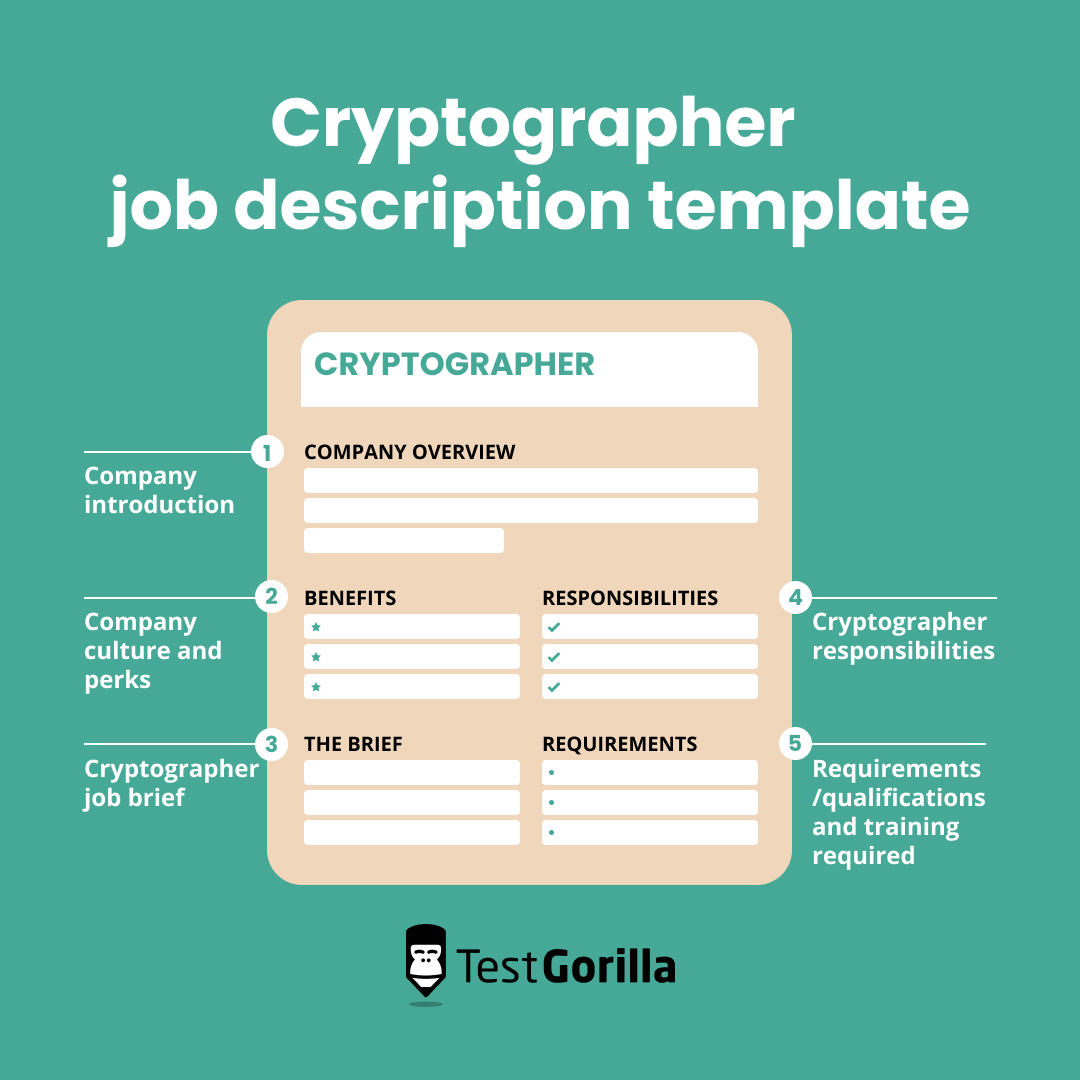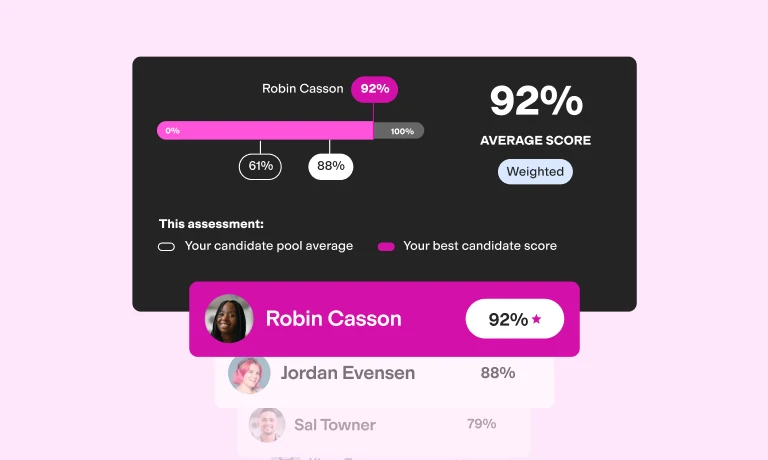A skilled cryptographer strengthens your data security while navigating the fast-paced world of cryptography. Finding a candidate who’s up to the task can be challenging, and this begins with an effective job description that attracts the right applicants.
An unclear job description could result in a mis-hire – which could lead to issues like data breaches and a tarnished reputation. So, crafting a comprehensive cryptographer job description is essential.
Because we know that writing job descriptions isn’t easy, we’ve compiled this guide. It highlights which skills you should look for and what your job description should and shouldn’t include.
This way, you can craft a job description that’s a magnet for top-tier talent. And there’s no need to start your job description from scratch: we also share a template.
Table of contents
- What is a cryptographer?
- Key skills to look for when hiring a cryptographer
- How to write a cryptographer job description
- Cryptographer job description template
- 3 things to avoid when crafting a job description
- Next Steps: Attracting and assessing candidates
- FAQs
- Use TestGorilla to hire skilled cryptographers
What is a cryptographer?
A cryptographer is an IT specialist who combines mathematics, computer science, and security to create and test systems that safeguard sensitive information.
When you make an online purchase using your credit card, it's cryptographers’ work that ensures your card details and personal information are encrypted and safe from hackers.
In a world where cyber-attacks happen frequently, the skills of cryptographers are invaluable. From securing government communications to protecting medical records, cryptographers play a major cybersecurity role in many industries to ensure data remains confidential and inaccessible to unauthorized parties.
Key skills to look for when hiring a cryptographer
When hiring a cryptographer, look for candidates with the following skills:
Strong mathematical and programming skills in languages like C++, Java, and Python
A deep understanding of cryptographic principles, algorithms, and protocols – along with cybersecurity and network security
Strong analytical and problem-solving skills to identify and address security flaws
Attention to detail, effective communication, ethical integrity, and a willingness to engage in continuous learning
The best insights on HR and recruitment, delivered to your inbox.
Biweekly updates. No spam. Unsubscribe any time.
How to write a cryptographer job description
Here are some tips to creating a clear, compelling job description:
Highlight security importance
Emphasize the critical role the cryptographer will play in protecting the company's data and intellectual property. Cryptographers must often use software that’s regulated by export control. Violating these regulations can result in severe penalties, including fines of up to $300,000 per violation.
By emphasizing data security in your cryptographer job description, you can attract candidates who are serious about their responsibilities.
Include project examples
Give a brief overview of typical projects they might handle – for example, developing a new secure platform for high-frequency trading at a Forex trading company. This provides clarity and can attract candidates who are genuinely interested in the work your company does and its specific challenges.
Detail the responsibilities
Clearly outline the day-to-day responsibilities and long-term objectives of the role. Be specific about the tasks the cryptographer will handle, such as developing algorithms, enhancing security protocols, or conducting deep cryptographic research.
A skills-based job description prioritizes responsibilities to attract candidates who believe they can handle those tasks. Candidates can determine whether their skills match the role’s needs. Ill-suited candidates are less likely to apply, while suitable candidates are more likely.
List the desired soft skills
Include essential soft skills like problem-solving, communication, attention to detail, ethical judgment, and stress management. Cryptographers need these skills to collaborate with multiple teams and effectively execute their technical duties.
Including soft skills in your job description helps candidates determine if they’re a good fit. For example, if you highlight "strong communication," a candidate who’s confident in their communication abilities might feel more encouraged to apply.
Cryptographer job description template
Here’s a job description template you can use to get started. Be sure to tweak it to your role and company.
Company introduction
Briefly describe your company and its mission. Mention any cutting-edge technology your company uses, and highlight noteworthy awards you’ve received.
Company culture and perks
Use this section to highlight your company’s views on the importance of data protection, user privacy, and overall cybersecurity. Make mention of any perks, like remote work options, technology stipends, and software subscriptions you have in place for a cryptographer.
Cryptographer job brief
[Company name]
Job title: [For example, Cryptographer, Junior Cryptographic Engineer, or Senior Cryptanalyst]
Reports to: [For example, Head of Cyber Security Department]
Position type: [Full-time, part-time, on-site, remote, or hybrid]
[Compensation details]
Cryptographer responsibilities
Design, develop, and implement advanced cryptographic algorithms.
Continuously improve and optimize existing cryptographic techniques and protocols.
Create comprehensive documentation for cryptographic algorithms, protocols, and procedures.
Identify and mitigate weaknesses within current cryptographic systems.
Evaluate and apply cryptographic theories based on our organization’s needs.
Enhance data protection by implementing more secure and encrypted solutions.
Adapt with the latest trends and advancements in cryptography and information security.
Cryptographer requirements/qualifications and training required
Bachelor’s/Master’s degree in computer science, data science, or a related field
Relevant certifications cryptography or cybersecurity, such as Certified Information Systems Security Professional (CISSP) or Certified Information Security Manager (CISM)
Proficiency in [mention specific languages/tools]
[Other qualifications based on your company’s specific needs]
3 things to avoid when crafting a job description
These common errors can impact the quality of your applicants:
1. Overloading with requirements
Avoid listing too many specific requirements that aren't essential for the role. For example, asking for proficiency in C++, Python, Java, Ruby, Go, Rust, Swift, Assembly, and other programming languages is overkill. This may turn away qualified cryptographers who don’t believe they tick every box.
The main coding languages a cryptographer needs proficiency in are C++ and Python. Consider including these in your requirements, as well as any other programming languages your organization uses.
2. Using exclusive or discriminatory language
Don’t use language that’s exclusive or discriminatory. Terms like "crypto ninja" or “crypto guru” might seem catchy, but they can deter potential candidates who don't identify with such terms. Instead, you might use phrases like “proficient in cryptographic algorithms” to describe the candidate you’re searching for.
Any language that seems to favor a particular demographic not only turns away top talent but can also land your company in legal trouble.
To engage in fair hiring, always aim for inclusive, neutral language that welcomes a diverse range of candidates and focuses solely on the skills and qualifications needed for the role.
3. Not providing flexible work models
With their unique skill set, cryptographers are rare and in demand. They often seek employers offering flexible work models, like remote or hybrid work. They frequently collaborate globally, making remote work models more practical.
Their work demands intense focus – often achieved in distraction-free environments like home offices. Surprisingly, working remotely can provide better security, as cryptographers can customize their home office security, minimizing risks like eavesdropping.
Not offering flexible work models in your job description can cause you to lose top talent to competitors. Many candidates today see this flexibility as essential, so without it, you'll likely get fewer applicants and miss out on top candidates.
Next Steps: Attracting and assessing candidates
After creating a comprehensive cryptographer job description, promote the position on sites popular among technology experts, like LinkedIn, GitHub, and other job boards.
Once you have a pool of applicants, consider using TestGorilla’s pre-employment tests to assess them. For example, TestGorilla's Cryptography test assesses candidates’ key skills, like public and private key cryptography.
You’ll have the most success combining role-specific tests with other tests – including personality and cognitive ability tests. You can combine up to five tests in a single assessment, and you can even customize tests with your own questions. Consider using our structured cybersecurity interview questions, for example.
With multi-measure assessments, you can get a comprehensive view of each candidate – enabling you to pick the best cryptographer for your role.
FAQs
What salary range should I include in my cryptographer job description?
Research industry reports, job sites that contain self-reported salaries (like Glassdoor), or job posts for similar roles to see what cryptographers currently earn. Offer a salary that’s aligned with your findings, accounting for things like experience level. A competitive salary range makes your job ad more enticing and attracts top talent.
Which career growth opportunities should I include in my cryptographer job description?
To sell your role, highlight opportunities for advancement to senior roles or other leadership positions. Also, emphasize the chance to work on diverse projects or contribute to cutting-edge cryptographic research.
Use TestGorilla to hire skilled cryptographers
A strong cryptographer job description is essential to attract top talent. It should clearly outline responsibilities, emphasize both technical and soft skills, and reflect your company's values. Without clarity and inclusivity, you risk missing out on the best candidates in a competitive market – ones who also align with your company.
Pair this job description with TestGorilla's range of pre-employment tests to simplify hiring. Evaluate candidates’ cryptographic skills, cybersecurity knowledge, problem-solving abilities, compatibility with your company culture, and more.
Want to learn more? Explore our product tour and free plan to see how TestGorilla can help you find the ideal cryptographer.
You've scrolled this far
Why not try TestGorilla for free, and see what happens when you put skills first.





















